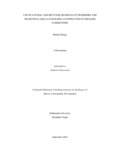
Please use this identifier to cite or link to this item:
https://hdl.handle.net/20.500.14301/475| Title: | Use of Natural and Recycled Materials with Modern and Traditional Skills in Building Construction in Nepalese Communities |
| Authors: | Dangol, Prakriti |
| Citation: | Dangol, P. (2024). Use of natural and recycled materials with modern and traditional skills in building construction in Nepalese communities. |
| Issue Date: | Sep-2024 |
| Publisher: | Kathmandu University School of Education |
| School: | SOED |
| Department: | Department of Development Studies |
| Level: | Masters |
| Program: | KUMSD |
| Abstract: | The study tries to understand the community’s perspective on sustainability and their perceptions towards natural and recycled materials in building construction. The study conducted in Dhoksan, Kathmandu, Nepal, pinpointed key aspects the community considers when choosing building construction materials and the reason behind their perceptions. Furthermore, the study has highlighted both the pros and cons of natural and concrete materials. In addition to construction materials, the study also discusses the type of building construction with required skills, primarily focusing on traditional and modern skills. This qualitative research, along with the case study strategy, examines the value of traditional skills alongside modern ones in constructing environmentally and financially beneficial buildings in communities in Nepal. The findings reveal that people in Dhoksan value the natural benefits of natural materials, but the concerns about durability and maintenance persist. Traditional skills are appreciated for their cultural and thermal significance. Yet, modern techniques are often preferred for their efficiency, suggesting a need for better awareness and integration of both traditional and modern methods for sustainable development. The findings could help architects, social workers, and community developers understand sustainable and community-driven building approaches. The integration of sustainable education, aided by indigenous knowledge exchange and modern architectural competence, emphasizes its transformative impact. |
| URI: | https://hdl.handle.net/20.500.14301/475 |
| Appears in Collections: | Research Project |
Files in This Item:
| File | Description | Size | Format | |
|---|---|---|---|---|
| 15Nov_Prakiti Draft Thesis_REVISED Clean Mode KU (3).pdf | 721.3 kB | Adobe PDF |  View/Open |
Items in DSpace are protected by copyright, with all rights reserved, unless otherwise indicated.